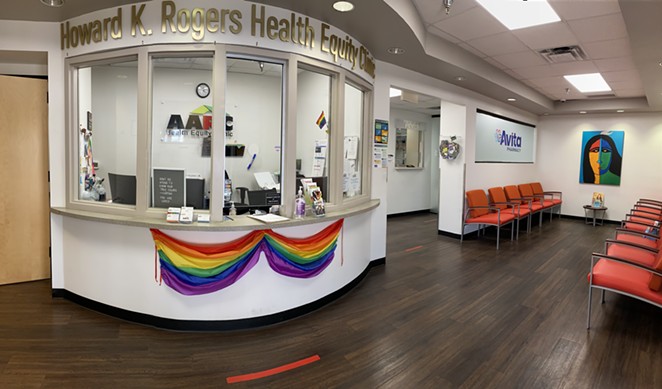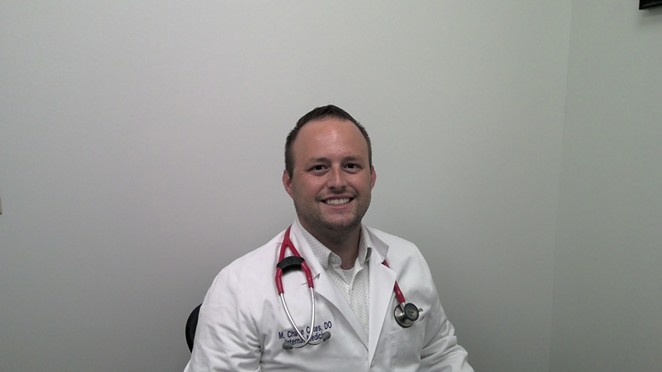ADVERTISEMENT. San Antonio Current news staff was not involved in the creation of this content. Please note, this report is not meant to treat or diagnose any illness. It is written for informational purposes only. If you have any health concern at all, please see a licensed healthcare professional.
Just five years ago the shortage of HIV care put a strain on HIV community of San Antonio. It could take four to six weeks to get into a clinic to begin treatment after the first diagnosis, time that was critical to the long-term health of the patient.
The leaders of the Alamo Area Resource Center knew something had to be done and the seeds for the Health Equity Clinic, now in its fifth year of operation, were planted.
“Starting a clinic is not cheap,” said Howard Rogers, AARC executive director. “We embraced a model where we would provide holistic HIV and LGBTQ care, but we did not have an on-site clinic.”
AARC, which began offering services to the San Antonio’s LGBTQ community in 1990, decided to adopt the Johns Hopkins University single point of HIV care model in 2001. That included mental health counseling, prevention, transportation, housing, and other supportive services for the community.
To fully complete the holistic approach, which also provided specialty care to San Antonio’s LGBTQ community, the non-profit entity would need to find money to create a welcoming clinical space staffed by caring experts in both the HIV and LGBTQ specialty care field.
Rogers and his team turned to a foundation started by Elton John, one of the most internationally recognized entertainers over three generations. The director of the Elton John AIDS Foundation visited the AARC in San Antonio and soon after awarded a grant to start the Health Equity Clinic.
The result was a welcoming medical office connected to AARC’s other services that quickly became a go-to place for both HIV-positive patient referrals from the city and a haven for primary healthcare for LGBTQ residents of all income levels.
The doors at 303 N. Frio opened in July, 2016 and official grand opening celebration followed in November.
“I wanted the clinic to look like and function as a top-notch clinic” on par with the model LGBTQ specialty clinics around the country’s major cities, Rogers said. The welcoming environment continues with the paperwork, which asks questions that are LGBTQ appropriate, reception staff and the doctors and nurses. “We don’t offer health care like a health factory,” Rogers said of scheduling hour-long first appointments and 30-minute follow-ups.
Rogers said the referrals from the city have the been considerable from the beginning, but that it took a little longer to get the word out to the larger LGBTQ population in and around Bexar County. “Word of mouth referrals have been significant,” he said. “Now, we’re kind of bursting at the seams in terms of space.”
The addition of Dr. Chase Cates in August 2020 brought even more notoriety and knowledge to the clinic. Cates holds the distinction as a member of the first class to hold a fellowship in LGBTQ Healthcare and HIV at the University of California at Los Angeles.
Cates said his first month on the job, partly because of a spike in COVID-19 cases in Bexar County and statewide, he had just one appointment a week. By December, however, every week was completely booked, and San Antonio’s Metropolitan Health District sent 13 newly diagnosed HIV patients for “Rapid Start” treatment to fit into the schedule.
Besides more space, Cates’ wish list includes an electronic medical records system to improve efficiency and allow for an increase in the number of patients the doctors can serve.
Cates said many patients have referred friends to the point that the clinic is now seeing about half uninsured patients and half with insurance. He believes that understanding and listening to the patients is a big part of that success, along with being more comfortable with a gay-identifying physician.
“In Los Angeles, there wasn’t that big of a fear that you would be judged. It’s like a bubble of diversity,” Cates said. In San Antonio, many patients have told Cates of bad experiences with providers. “The culture is different here and I’m doing my best to end those stigmas.”
Gregory Casillas, whose older brother was one of the early casualties in the U.S.’s struggle with AIDS, said he became a patient at the Health Equity Clinic when he moved to San Antonio in 2017 after several years in Costa Rica.
Casillas was diagnosed with HIV in 2000 while living in San Francisco. Thanks to new medicines and access to them through the AARC, he said one pill a day had suppressed his HIV to undetectable levels within three months of engaging with AARC providers.
“It’s not a death sentence anymore,” said Casillas, who also is assistant director at the Thrive Youth Center serving homeless LGBTQ people ages 18 to 24. “Life can be more difficult if you don’t do what you need to do.”
He said that’s why he has become an advocate for AARC’s clinic.
“They take those things very seriously. Once HIV is diagnosed, they don’t revisit how it happened,” which can retraumatize the patient. “It doesn’t matter what economic level that person is on. They work hard to diligently ensure that people have a say in their health care. It’s not just following doctor’s orders. They provide an environment for the patient to have a conversation. You don’t know when someone is going to disengage (from medical treatment) because somebody said the wrong thing.”
Expanding the space and services are in the exploration stages and AARC leaders believe their five-year track record of success and stewardship of other grants will help attract the resources needed to take the next step.
For example, the Elton John AIDS Foundation gave the clinic a third grant during the COVID-19 pandemic to implement telemedicine to allow patients and medical professionals to continue providing care even during county-wide lockdowns. AARC had the program up and running in just 30 days.
“We’re very grateful to our funders and to our community for supporting what we do,” Rogers said. Learn more about Alamo Area Resource Center here.
–
The statements made in this sponsored post are those of the paid sponsor and not those of San Antonio Current, and are not intended as medical advice. Consult your doctor before undertaking any changes to your physical, mental or dietary health.

















